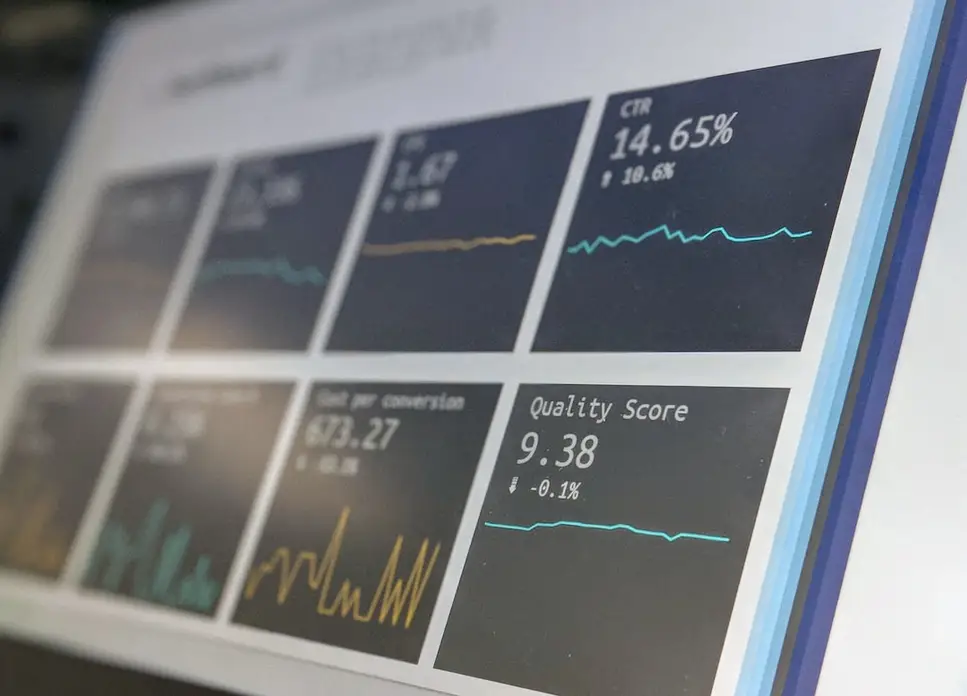Piga gumzo na Ava - Mshauri wako wa Biashara wa AI
Hujambo mimi ni Ava, mwongozo wako wa AI wa kuboresha biashara yako!
Iwe tayari unafanya biashara au una ndoto ya kuanzisha biashara, niko hapa kukusaidia kubadilisha maono yako kuwa uhalisia kwa kutumia wafanyakazi huru wanaotumia AI. Shiriki malengo yako ya biashara, na kwa pamoja, tutaunda mradi ambao wafanyikazi wetu walio na talanta wanaweza kutoa zabuni. Wacha tufanye maono yako kuwa ukweli!
Nina biashara
Ninaanzisha biashara
Hitilafu fulani imetokea wakati wa kutuma mazungumzo kwenye barua pepe yako. Tafadhali jaribu tena baadae.
Unaweza kuhifadhi mazungumzo yako mara moja tu kwa saa. Tafadhali jaribu tena baadae.
Mazungumzo yako ni mafupi sana. Endelea kupiga gumzo na Ava ili kuwezesha kuhifadhi.
Your Guide to Finding Premier Statistical Analyzers Near You
Are you looking for ways to easily access statistical analysis services in your area?
13 Apr 2023 • 17 dakika za kusoma
Ilisasishwa mnamo 26 Apr 2023 na Hector P.

Digital Marketer | 10+ years experience
Imeshindwa kunakili kwenye ubao wa kunakili, tafadhali jaribu tena baada ya kurekebisha ruhusa zako.
Imenakiliwa kwenye ubao wa kunakili.

Are you on the lookout for a Statistical Analysis expert to help you with your data, research, or business decisions? Look no further; we have your back! Finding a skilled Statistical Analyser has never been easier thanks to today's technology and the numerous talented individuals in this field.
A great starting point for your search is turning to online platforms, where you can find countless professionals offering statistical analysis services. Websites like Upwork, Freelancer, and Toptal are excellent places to find both local and remote freelancers who are experienced in statistical analysis. Simply create a job posting stating your requirements, and soon enough, you'll have a pool of talented individuals eager to assist you with your needs.
Professional networking platforms such as LinkedIn are another excellent resource to tap into. By searching for "Statistical Analysers," you will be able to find professionals with relevant backgrounds in your area or even worldwide. Don't hesitate to reach out via direct messages or connections if you come across a profile that fits the bill for what you're looking for.
If you prefer working with local talent, attending industry workshops, conferences, or meet-ups is another fantastic way to meet skilled Statistical Analysers in person. Networking in these settings allows you to forge connections with professionals who may be able to offer valuable insights and guidance based on your specific needs.
If partnering with a statistical analysis firm is more up your alley, searching for local consulting firms specializing in data analysis will help narrow down the candidates. Many firms have dedicated teams of experts ready to handle various projects of different sizes and complexities. A simple "Statistical Analysis firm near me" search should do the trick!
In conclusion, finding the perfect Statistical Analyser for your needs may take a bit of research and networking, but there is no shortage of talented individuals in the field. Keep an open mind regarding local and remote options, and dive into the wonderful world of data-backed decision-making!
Demystifying Statistical Analysis: A Comprehensive Guide
Get ready for a thrilling journey into the exciting world of numbers, data, graphs, and powerful insights! Are you curious about what statistical analysis entails and how it can help? Let's break it down step-by-step, and along the way, we'll uncover the main elements that make statistical analysis such a fascinating subject.
Statistical analysis is a process that involves the collection, examination, interpretation, presentation, and modeling of data. Essentially, it's a powerful tool to help make sense of complex and vast data sets. There are different techniques used in statistical analysis, including descriptive statistics (the numerical description of data), inferential statistics (drawing conclusions from data samples), regression analysis (predicting relationships between variables), time series analysis (studying trends over time), and many more. These techniques are applied across various sectors like business, finance, health care, sports analytics - you name it!
The primary goal of statistical analysis is to reveal correlations between variables, patterns or trends in data sets, and offer solid evidence to support decision-making processes. By systematically examining patterns in large volumes of data using probability theories and computational tools, statistical analysts - also known as statisticians - identify ways to optimize efficiency, reduce costs or maximize profits.
Some key benefits of statistical analysis include: identification of underlying trends or relationships within the data; ability to make informed decisions based on objective insights; effective use of resources; identification of opportunities for growth or improvement; development and testing of hypothesis; accurate forecasts and predictions; and effective communication of results visually through charts, graphs or tables.
In summary, statistical analysis not only helps us understand the present conditions but also provides us with a reliable roadmap for future actions. It essentially serves as the backbone upon which our more profound understanding of complex situations rests. Once you start harnessing the true power and potential of data through statistical analysis, you’ll enjoy an exciting new world full of insights and possibilities! So, let's dive deeper into this fascinating world and meet the talented individuals known as statistical analysers. Stay tuned!
Meet the Masterminds: Who are Statistical Analysers?
In today's data-driven world, the ability to make informed decisions based on accurate information has become a must-have skill for companies of all sizes. And here's where Statistical Analysers come in! These are the experts who can help us transform raw numbers into actionable insights. Today, let's get to know them better and understand their role in various industries.
At their core, Statistical Analysers are data experts who specialize in analyzing complex numerical data using statistical methods. They come from various educational backgrounds, such as Mathematics, Statistics, Economics, Engineering, or any other field that demands rigorous analytical training. Basically, if they're proficient in math and can extract valuable trends from massive datasets – they're definitely our go-to professionals!
Their work typically involves collecting data, applying different statistical models and techniques, interpreting results, and presenting them in a meaningful way to stakeholders. In addition to technical prowess, Statistical Analysers also possess excellent communication skills – after all, what good is an amazing analysis if it cannot be shared with the team effectively?
Statistical Analysers are employed across numerous industries; some common ones include Finance, Healthcare, Marketing, and Academia. Let's say a tax advisory firm needs to analyze tax revenue data to forecast future trends – a Statistical Analyser could help them do just that! Or perhaps a leading eCommerce platform wants to assess customer lifetime value by examining purchase patterns among its users – again, it's the Statistical Analyser who'll come to the rescue.
Beyond industry-specific applications, there is also tremendous scope for Statistical Analysers in public policy and research projects that involve analyzing census data or survey results. For instance, they can play a central role in evaluating the effectiveness of educational programs by examining student performance data over time.
In conclusion, Statistical Analysers are truly the champions of data, providing us with valuable insights that can inform better decision-making. With their exceptional analytical and communication skills, they bridge the gap between complex data and real-world applications. So the next time you're faced with a mountain of numbers and don't know where to begin – don't fret! Turn to a Statistical Analyser and watch them transform that daunting pile into an insightful treasure trove.
Identifying a Good Statistical Analyser: Find the Right Fit for Your Project
It's an exciting time when you're ready to dive into the world of data and statistics! But don't let the enthusiasm of that first step intimidate you. Engaging a statistical analyser can be as smooth as silk if you know what to look for. In this article, we're focusing on finding the perfect match for your project by identifying a good statistical analyser. Let's get started!
First things first: Do your homework! Familiarize yourself with the basic concepts of statistics and understand the objectives you want to achieve with your project. This will not only make it easier for you to communicate your vision but also help you identify an expert in your niche. Remember, having a general idea about the specific requirements will put you in the driver's seat.
Next up, it's time to search for talented individuals with a strong background in statistics. They should hold at least a Bachelor's degree in Statistics or related major and preferably have practical experience in their field. But do not stop here; inquire about their proficiency with different statistical software such as R, SAS, or SPSS. These qualities demonstrate their adaptability and expertise, ensuring that they are well-prepared for varying analytical challenges.
Delve deeper into their work experience by checking out their portfolios and previous projects. Reach out to their former clients if possible and ask for a recommendation or read testimonials available online. Check if they have worked on projects similar to yours, as this demonstrates their relevance and expertise in your domain.
It would be best to evaluate their communication skills because effective communication plays a crucial role in successfully executing your project. Remember, it is essential to establish a good rapport with your statistical analyser right from the beginning as collaboration is key! A professional, friendly, and confident person will make the process much smoother.
Lastly, be sure that the potential candidate is familiar with various data visualization techniques. This will assist you in understanding complex statistical results and presenting them in a clear, digestible manner to your audience.
Gathering all this information might require a little patience and diligence, but it will be worth it in the end when you find the perfect statistical analyser for your project! So, take a deep breath, follow these tips and embark on your analytical journey with confidence.
Cost of Statistical Analysis by a Statistical Analyser
Choosing to work with a statistical analyser can be a smart investment for your business, as they possess the knowledge and expertise to make sense of complex data and help you drive improvements. Our focus in this article is solely on the cost aspect of engaging a statistical analyser, and not on their other qualities. So, let's dive into understanding the factors that affect their pricing!
First and foremost, the cost often depends on the experience and qualifications of the statistical analyser. It's generally expected that a professional with higher qualifications and more years spent in data analysis would charge more for their services. But at the same time, an experienced statistical analyser might be more efficient and therefore faster at accomplishing tasks, which could lead to lower costs in the long run. Moreover, they might require less supervision and involvement from your team, giving you more time to focus on other aspects of your business.
Another factor that can influence cost is the size and complexity of your project. A large dataset with numerous variables would likely require more time to analyze compared to a smaller dataset with fewer variables. Similarly, advanced statistical techniques like predictive modeling or hypothesis testing could be more expensive than simpler descriptive analyses. In such cases, you might want to explore the possibility of breaking down your analysis into smaller phases to control costs better.
The geographical location of your statistical analyser might also play a role in pricing. While remote collaboration has become more prevalent these days, local talent might still command a premium depending on their city or country's cost of living. Nevertheless, it's important not to let geographical factors solely drive your decision. Instead, consider other aspects like how well they understand your industry or if there are specific cost-saving opportunities from working with someone located nearby.
Beyond these factors, some additional points to keep in mind include whether the statistical analyser operates as a freelancer or an agency and if they offer packaged services or customized solutions. These elements could impact the pricing structure of their offerings, so always be sure to clarify costs and deliverables before signing any contracts.
In conclusion, it is important to understand that the cost of statistical analysis is influenced by a variety of factors that may vary from one project to another. We recommend researching your options thoroughly, reaching out to multiple statistical analysers for quotes, and carefully considering the unique needs of your business. This will aid you in finding the perfect fit for your data analysis needs, without breaking the bank!
Deliverables from a Statistical Analyser: What You Can Expect
After all the effort spent on finding the perfect Statistical Analyser, the big question remains: what outcomes can you expect from them? Here's an overview of the deliverables that a typical Statistical Analyser will provide, to help you better understand the value they can bring to your project.
Firstly, when it comes to data processing and cleaning, a professional Statistical Analyser is skilled in turning raw data into quality datasets. They don't just jump straight into analyzing the data – they take their time, removing errors and filling in any gaps to ensure clean, high-quality data before proceeding to extract insights. Expect them to use specialized software and techniques for data cleaning to ensure maximum accuracy.
Once the data is cleaned up and ready for analysis, a capable Statistical Analyser will expertly dive into rigorous data investigation. They'll perform various statistical tests and analyses to unveil patterns, trends, or correlations that may exist within your data. From parametric tests like regressions and ANOVA to non-parametric tests such as chi-square or Kruskal-Wallis – your expert will know which method is best suited for your particular dataset and research question.
But what good is all this deep-dive analysis if you can't make sense of it? An experienced Statistical Analyser will deliver easy-to-understand reports – featuring clear visuals like charts and graphs – that effectively communicate what they've discovered during their analysis. They should also be able to provide you with a detailed interpretation of their findings, ensuring you possess a full understanding of the results.
Furthermore, expect your ideal Statistical Analyser to not only offer insights based on their analyses but also suggest actionable solutions backed by these insights. This means they'll not only tell you what's happening but why it's happening, alongside any recommendations for improvements or alterations to your current strategies.
Lastly, a proficient Statistical Analyser will be your partner in risk management. They can help you identify potential risks and measure their likelihood and impact, advocating data-driven decision-making to move your project forward with confidence.
To sum it up, engaging a high-quality Statistical Analyser can bring immense value to your project through clean data, robust analyses, clear communication of results, actionable insights, and thorough risk assessment – paving the way for well-informed decision-making and ultimately propelling your project to success.
Working Remotely with a Statistical Analyser: Tips and Insights
In today's globalized world, working remotely with a statistical analyser has become increasingly popular thanks to advancements in communication technology. Remote collaboration allows businesses to access a diverse talent pool and provides flexibility for both the statistical analyser and the client. In this article, we will explore the various aspects of working remotely with a statistical analyser and provide some helpful tips for businesses to effectively collaborate with them.
First and foremost, it is vital to establish an open line of communication between you and your statistical analyser. This can be achieved through various platforms such as email, phone, or project management tools that are available in the market. Communication is the key factor for success in any project, especially when collaborating remotely. Make sure that your concerns are conveyed clearly so that your statistical analyser understands your expectations.
Secondly, set achievable milestones and specific deadlines. This helps provide a sense of direction to both the client and the statistical analyser, ensuring that deadlines are met while maintaining work quality. Furthermore, keeping track of progress throughout the project can be achieved by regularly updating each other on achievements or setbacks through agreed-upon channels.
Thirdly, clarify intellectual property ownership rights from the onset. Understanding who owns what in terms of data used or generated can help prevent misunderstandings down the road. A formal agreement outlining these issues could save you from potential disputes that may arise in the long run.
Technological advancements have made it possible for businesses to seamlessly collaborate with remote professionals like statistical analysers across the globe. However, it is still important to maintain trust and transparency by fostering strong collaboration skills throughout the entire process. By following these tips and working closely with a remote statistical analyser, you can create an environment that will ensure optimum results for your project.
In conclusion, remote work has its benefits and challenges, but with the right mindset and approach, any business can effectively collaborate with a statistical analyser from any location. By incorporating effective communication methods, setting clear goals and expectations, and maintaining transparency throughout the entire process, working remotely with a statistical analyser can prove to be a beneficial and rewarding experience for all parties involved.
Pros and Cons of Local vs. Remote Statistical Analysers
As technology continues to advance and bridge the gap between industries across the globe, communication tools are more vital than ever in collaborative work settings. In the case of working with statistical analysers, it is important to carefully consider the pros and cons of engaging with local talent or remote professionals for your specific project requirements. In this article, we will be exploring these advantages and challenges to help you make a well-informed decision for your business.
Firstly, let us shed some light on the benefits of local statistical analysers. As the term 'local' suggests, they can be available in close proximity, making face-to-face meetings more viable. This allows for building strong professional relationships in real-time with better communication. Moreover, a shared familiarity of culture and language may reduce misunderstandings during work-related matters. With a faster response time and an improved understanding of local industry trends or legislation, this option seems pretty compelling.
On the other hand, remote statistical analysers come with their own set of benefits. The foremost advantage is gaining access to a larger pool of experts - this raises the likelihood of finding individuals with niche skill sets or specific expertise in a particular industry. Additionally, remote statisticians may offer cost-saving opportunities as they don't require physical presence or overhead expenses. The online nature of their work also encourages flexible working arrangements that can accommodate different time zones or schedules.
However, these engagements are bound to have their challenges as well. Local statistical analysers might be constrained by limited availability or higher costs, especially if you are located in an area with high-demand or greater cost of living expenses. In the case of remote professionals, a few problems to consider include discrepancies in communication due to language barriers and differing time zones that can hinder collaboration.
In conclusion, the decision to work with a local or remote statistical analyser entails careful consideration of your project's specific requirements. It is essential to strike the right balance between proximity, communication, and collaboration, while also taking advantage of cost-saving opportunities and access to niche skill sets. Both paths offer unique pros and cons, so make sure to evaluate them thoroughly before making your choice!
Pros and Cons of Freelance vs. Agency Statistical Analysers
After deciding to work with a Statistical Analyser, you must then choose between a freelance or an agency-based expert. In order to better understand which option best suits your needs, let's dive into the pros and cons of each choice.
Freelance Statistical Analysers
Working with a freelance Statistical Analyser might be the right choice for many, as it offers several advantages:
Cost-Effective:
Flexibility:
Personalized Approach:
However, there are some drawbacks as well:
Limited Support:
Inconsistent Quality:
Agency-Based Statistical Analysers
Hiring an agency brings its own set of advantages to the table:
Comprehensive Expertise:
Reliability:
Accountability:
However, agencies come with their own set of disadvantages:
Higher Costs:
Potential Communication Barriers:
In conclusion, your choice between a freelance or agency-based Statistical Analyser largely depends on your specific needs, budget constraints, and risk tolerance. One method is not inherently better than the other; rather, you must assess your unique situation to determine the best course of action. As you weigh the pros and cons outlined above, keep in mind that both options have many successful professionals ready to help you achieve your goals!
Recapping the Essentials: What to Consider when Engaging Statistical Analysers
Statistical analysis is an essential component of many businesses and research activities. Through the application of various techniques, it allows us to make data-driven decisions and draw meaningful conclusions from vast amounts of information. This need for accurate and efficient interpretation of data has led to a rise in demand for skilled professionals who excel in statistical analysis – Statistical Analysers.
As businesses increasingly turn to freelance platforms such as Freelancer.com, it is imperative to know how to engage the right Statistical Analyser and what to expect from them. Start by identifying a good Statistical Analyser who has demonstrated expertise in your field or industry. Look for their body of work, reviews, and ratings, which can help you determine whether they are the right fit for your project.
Understanding and comparing costs is another essential aspect of engaging Statistical Analyser services. The cost of statistical analysis can vary depending on factors such as experience level, location, or complexity of the project. Be prepared with a budget that takes these factors into account and use it to make informed decisions when considering different candidates.
Equally important are the deliverables you expect from your Statistical Analyser. Be clear on what outcomes and results you require from their work – be specific about data sets, methodologies, reporting requirements, and timelines. This clarity will pave the way for a smooth working relationship between you and your Statistical Analyser.
In today's global market, businesses have the option to choose between local or remote Statistical Analysers. Weighing the pros and cons of local vs. remote Statistical Analysers is crucial in deciding which option best meets your needs.
While local talent may offer the advantage of similar timezone communication and face-to-face consultations, remote Statistical Analysers can provide access to a wider range of expertise and a more significant choice to fit your budget. Also, consider if you prefer working with a freelance individual or an agency. Freelance Statistical Analysers are generally more cost-effective, while agencies could provide comprehensive data analysis solutions.
In conclusion, engaging a Statistical Analyser is a critical step in harnessing the power of data-driven decision-making. By considering your needs and preferences while assessing the expertise, cost, deliverables, location, and freelancer vs. agency options, you'll be on your way to building fruitful collaborations with expert Statistical Analysers from all over the world!
Final Thoughts and Recommendations on Statistical Analysers
In today's data-driven world, statistical analysis has become a significant pillar for institutions and businesses to make well-informed decisions, derive insights, and drive growth. Having discussed the various aspects of engaging, working with, and choosing between local and remote statistical analysers, it's time to wrap up our discussion with some final thoughts and recommendations on this topic.
Firstly, always remember that the success of your project heavily relies on the quality of the statistical analyser you engage. Therefore, ensure a thorough evaluation of their skillset, qualifications, experience, and past projects. It is also essential to weigh in the cost-benefit analysis when selecting between local or remote talent.
A significant advantage of hiring local talent that cannot be overlooked is convenience – particularly when it comes to communication and cultural understanding. Working with an expert in your area allows more accessible face-to-face meetings that can result in enhanced collaboration and smoother management of tasks. This further ensures seamless information sharing and contributes to improved work quality.
On the other hand, remote talent can be advantageous when it comes to cost-effectiveness or accessing niche skills that may not be available locally. In this technological age, geographical barriers have dissolved for global collaboration using various tools for communication and project management. This makes working remotely just as practical in certain cases.
In conclusion, while there are pros and cons to both local and remote statistical analysers, your choice heavily depends on factors such as cost, accessibility to niche skills or specific resources, communication preferences or the need for face-to-face interactions. Reflecting upon these considerations will help you in choosing an appropriate statistical analyser who meets your project requirements holistically.
The journey of finding the perfect statistical analyser is crucial for your business's data-driven growth journey. With online platforms like Freelancer.com, this journey has become more accessible than ever. The power of choice lies in your hands – invest time in understanding your project requirements, weighing options, and ultimately selecting the perfect partner for all your statistical analysis needs.
Hire an Expert Statistical Analyser on Freelancer.com
Now that we've discussed the definition of Statistical Analysis, who Statistical Analysers are, how to engage them, and how to work with them, it's time for the exciting part: hiring an expert Statistical Analyser! And guess what? There's an amazing platform to connect with these talented professionals - Freelancer.com .
Freelancer.com is a fantastic online marketplace where you can find thousands of freelance experts in various fields, including statistical analysers. They offer a range of services such as data analysis, forecasting, risk assessment, financial analysis and more. Here are some key reasons why you should consider hiring a statistical analyser on this platform:
In conclusion, hiring an expert statistical analyser can be a game-changer for your business, and there's no better place to find one than Freelancer.com. So go ahead, give it a try, and witness the power of data-driven insights in driving your success!
Tueleze nini unachohitaji kifanywe
Weka jina la mradi wako
Hadithi Zinazohusiana
Zungumza na mmoja wa Marubani Wetu wa Kiufundi ili kukusaidia katika mradi wako
Nakala Zinazopendekezwa Kwa Ajili Yako Tu

Whether you know it or not, your business collects a lot of data. Data science helps you use that data as a powerful tool to improve your business.
5 min read

Your search for the right freelancer doesn't have to be a mythical quest. Here are 7 steps to finding the best freelance worker for your needs.
10 min read

Does your business need cybersecurity expertise? You need to learn how to attract the right kind of talent, and where to look
5 min read

Hiring freelancers for a project can save you time and money, but it's important to understand how to get the best results
4 min read
Asante! Tumekutumia kiungo cha kudai mkopo wako bila malipo kwa barua pepe.
Hitilafu fulani imetokea wakati wa kutuma barua pepe yako. Tafadhali jaribu tena.
Onyesho la kukagua linapakia
Ruhusa imetolewa kwa Uwekaji wa Kijiografia.
Muda wako wa kuingia umeisha na umetoka nje. Tafadhali ingia tena.




